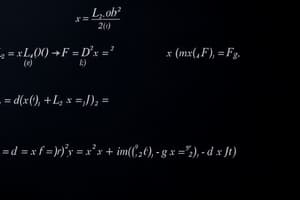Podcast
Questions and Answers
What is the main purpose of the first fundamental theorem of calculus?
What is the main purpose of the first fundamental theorem of calculus?
- To link the definite integral to an antiderivative (correct)
- To define what a function is in calculus
- To explain the concept of continuity for functions
- To evaluate the convergence of infinite series
Which of the following best describes the second fundamental theorem of calculus?
Which of the following best describes the second fundamental theorem of calculus?
- It relates to the properties of polynomial functions
- It provides a method for finding an antiderivative via integration (correct)
- It defines how to evaluate limits in calculus
- It confirms the continuity of a function
How does the fundamental theorem of calculus assist in problem-solving?
How does the fundamental theorem of calculus assist in problem-solving?
- It offers methods for analyzing infinite series
- It provides a theoretical framework for vector analysis
- It aids in evaluating definite integrals for determining accumulated change (correct)
- It explains the different types of functions used in calculus
What role does continuity play in calculus?
What role does continuity play in calculus?
Why is understanding infinite series important in calculus?
Why is understanding infinite series important in calculus?
What is the primary focus of differential calculus?
What is the primary focus of differential calculus?
Which of the following best defines a derivative?
Which of the following best defines a derivative?
What role do limits play in differential calculus?
What role do limits play in differential calculus?
What is the result of an indefinite integral?
What is the result of an indefinite integral?
Which technique is commonly used for finding antiderivatives?
Which technique is commonly used for finding antiderivatives?
What does the fundamental theorem of calculus establish?
What does the fundamental theorem of calculus establish?
Which application of derivatives involves finding extremum points?
Which application of derivatives involves finding extremum points?
In terms of integral calculus, what do definite integrals calculate?
In terms of integral calculus, what do definite integrals calculate?
Flashcards
Calculus
Calculus
A branch of mathematics that studies change, including rates of change, slopes of curves, and accumulation of quantities.
Derivative
Derivative
A tool in calculus that describes how a function's value changes as its input changes.
Integral Calculus
Integral Calculus
The process of finding areas under curves, volumes, and accumulation of quantities.
Limit
Limit
Signup and view all the flashcards
Rules of Differentiation
Rules of Differentiation
Signup and view all the flashcards
Fundamental Theorem of Calculus
Fundamental Theorem of Calculus
Signup and view all the flashcards
Techniques of Integration
Techniques of Integration
Signup and view all the flashcards
Integration
Integration
Signup and view all the flashcards
First Fundamental Theorem of Calculus
First Fundamental Theorem of Calculus
Signup and view all the flashcards
Second Fundamental Theorem of Calculus
Second Fundamental Theorem of Calculus
Signup and view all the flashcards
Functions in Calculus
Functions in Calculus
Signup and view all the flashcards
Continuity in Calculus
Continuity in Calculus
Signup and view all the flashcards
Infinite Series in Calculus
Infinite Series in Calculus
Signup and view all the flashcards
Study Notes
Fundamental Concepts
- Calculus is a branch of mathematics focused on change, encompassing differential and integral calculus.
- Differential calculus analyzes rates of change, slopes, and tangents.
- Integral calculus calculates areas, volumes, and accumulated quantities.
- These branches are linked by the fundamental theorem.
Differential Calculus
- Limits: Fundamental to differential calculus, a limit describes a function's behavior as its input approaches a value. Limits are essential for defining continuity and derivatives.
- Derivatives: A derivative shows the instantaneous rate of change at a point, geometrically representing a tangent line's slope. Notation includes
f'(x)anddy/dx. - Rules of Differentiation: Simplifying derivative calculation, rules like power, product, quotient, and chain rules are key. These rules apply to simple and complex functions.
- Applications of Derivatives: Derivatives apply in finding function maximum/minimum points (optimization), sketching graphs, and calculating velocity/acceleration. Understanding slopes reveals how quantities change over time or space.
Integral Calculus
- Integrals: Integrals represent the area beneath a curve; definite integrals calculate a specific area, while indefinite integrals yield a family of functions.
- Techniques of Integration: Methods to find antiderivatives (the reverse of differentiation) include substitution, integration by parts, and trigonometric techniques.
- Applications of Integrals: Integrals apply in science and engineering for calculating areas, volumes, work, and centroids. Integrals also describe accumulated trends.
Fundamental Theorem of Calculus
- Connecting Differentiation and Integration: This theorem establishes the inverse relationship between differentiation and integration. The first theorem links definite integrals to antiderivatives, crucial for evaluating them. The second theorem explains how to find antiderivatives.
- Practical Implications: Calculus' fundamental theorem provides practical methods for calculating definite integrals, essential for solving accumulated change problems.
Related Concepts
- Functions: Calculus strongly relies on functions, including polynomial, exponential, trigonometric, and logarithmic functions.
- Continuity: A continuous function has no gaps or jumps in its graph, critical for defining derivatives and integrals.
- Series: Analyzing infinite series, including convergence, is necessary for representing functions as infinite sums and for obtaining approximate values.
- Vectors: Vectors, particularly vector-valued functions and velocity fields, are relevant in calculus applications.
- Coordinate Geometry: Understanding graphs and curves is vital for geometrical interpretations of calculus concepts.
Studying That Suits You
Use AI to generate personalized quizzes and flashcards to suit your learning preferences.




